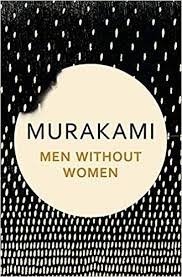Men without Women

Ratings: 4.2 /5
Author: Haruki Murakami
Paperback: 240 pages
Publisher: Random House UK
Publishing Date: 16 August 2017
Language: English
Genre: Short Stories Collection, Contemporary fiction
ISBN-10: 191121537X
ISBN-13: 978-1911215370
Cost: Rs. 399 (Paperback), Rs.228 (Kindle)
Description:
Men Without Women is a 2014 collection of short stories by Japanese author Haruki Murakami, translated and published in English in 2017. The stories are about men who have lost women in their lives, usually to other men or death. The collection shares its title with Ernest Hemingway's second short story collection.
Review:
‘Men Without Women’ is a themed collection of seven stories about wounded men who can’t seem to hold on to the women they love. It is interesting to note that every story in this book ends with a comma, never a full stop. The story has neither a definite ‘end’ nor a definite ‘beginning’. It could have started anywhere and ended anywhere. It flows forming its own path, its own story, its own meaning.
The seven stories: ‘Drive my car’, ‘Yesterday’, ‘An independent organ’, ‘Scheherazade’, ‘Kino’, ‘Samsa in love’ and ‘Men without women’; all are connected by a thread of similar elements between them - a disappearing cat, a bar populated by lonely whiskey-drinkers and jazz music, Kafka, Beatles songs.
Murakami’s style of writing is more casual and is humorous towards his words, discarding the tragic or serious style of writing. He has a style of writing short paragraphs and focus on the character’s psyche and not so much on the environment. Often, the protagonists are people who follow societal norms while feeling pessimistic about anything they do. While this isn’t anything particularly new, it is very important considering the context of post-war Japanese society.
The theme of ‘alienation’ and sense of ‘loss is prominent’ is found in most of his novels. Similarly in ‘Men without Women’, by exploring isolation and the angst of loneliness, from the void left by the women in the lives of these men, the collection becomes a dynamic exploration of human relationships, love and the way men perceive their opposite sex.
Reception for the collection has been mostly positive. ‘Lucy Scholes’, writing for The Independent, states that the stories "strung together are a sparkling strand of precious stones, the light refracted from each equally brilliant but the tones varying subtly.
‘Heller McAlpin’, writing for The Washington Post, states that these meandering, mesmerizing tales of profound alienation are driven by puzzling circumstances that neither his characters nor readers can crack — recalling existentialist Gabriel Marcel’s assertion that 'Life is not a problem to be solved but a mystery to be experienced.
About the author:
Murakami Haruki (Japanese: 村上 春樹) is a popular contemporary Japanese writer and translator. His work has been described as 'easily accessible, yet profoundly complex'. Many of his novels have themes and titles that invoke classical music, such as the three books making up The Wind-Up Bird Chronicle: The Thieving Magpie (after Rossini's opera), Bird as Prophet (after a piano piece by Robert Schumann usually known in English as The Prophet Bird), and The Bird-Catcher (a character in Mozart's opera The Magic Flute).
Some of his novels take their titles from songs: Dance, Dance, Dance (after The Dells' song, although it is widely thought it was titled after the Beach Boys tune), Norwegian Wood (after The Beatles' song) and South of the Border, West of the Sun (the first part being the title of a song by Nat King Cole).
Recommendations:
“If you only read the books what everyone else reading, you can only think what everyone else is thinking.” – Norwegian Wood
“Haruki Murakami’s Men Without Women examines what happens to characters without important women in their lives; it'll move you and confuse you and sometimes leave you with more questions than answers.” — Barack Obama















































